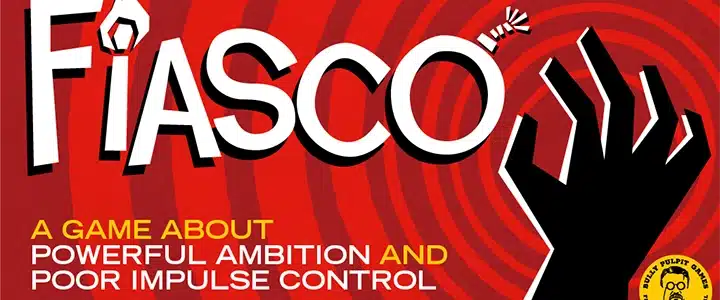I struggled with this prompt because I couldn’t think of a “simple” game I own, and it seems like most of my RPGs are pretty complex.
And then I thought of Fiasco. Described as a game about “powerful ambitions and power impulse control”, Fiasco is inspired by all of those movies whose characters start with great ideas and end dying by gunshot, car crash, or wood chipper. The book’s intro blurb sums it up perfectly:
“Fiasco is inspired by cinematic tales of small-time capers gone disastrously wrong – particularly films like Blood Simple, Fargo, The Way of the Gun, Burn After Reading, and A Simple Plan. You’ll play ordinary people with powerful ambition and poor impulse control. There will be big dreams and flawed execution. It won’t go well for them, to put it mildly, and in the end it will probably collapse into a glorious heap of jealousy, murder, and recrimination. Lives and reputations will be lost, painful wisdom will be gained, and if you are really lucky, your guy just might end up back where he started.”
I played it twice – once in a Harry Dresden-themed game at MEPACON and a Star Wars-themed game I played with my home group. As I described in my blog post about the Star Wars Fiasco:
The game is divided up into four stages. The first is set up, in which you establish your characters and the relationships between them. Setup also determines their essential needs, important objects (e.g. guns, drugs, a $1 million in unmarked bills), and notable locations (dive bar, my uncle’s old hunting lodge). Then comes Act 1, in which the fiasco unfolds, the story is established, and the narrative starts building towards a series of unfortunate events). In the middle of the game comes The Flip, which adds further complications to the game. Act 2 is where it all goes to hell, with your characters along for the ride (or more specifically, driving the 18 wheeler of doom). It all ends with the Aftermath, where you determine just how bad things ended for your character (spoiler alert: probably pretty bad).
This gamemaster-less game has a shared dice pool mechanic that drives the transition between acts. There’s also a shifting narrative mechanic where you can either Establish or Resolve a scene… but not both. It’s a simple and elegant ruleset that – as the Harry Dresden and Star Wars examples show – can easily be adapted to a variety of genres. There are hundreds of “playsets” developed by fans – these are basically scenario packs that set up the scenario, and provide advice on how to run it. A great site for finding these is Fiasco Playsets which a searchable list of offerings. Entries are also tagged with phrases like “sci-fi”, “Star Wars”, and “custom rules” so you can quickly navigate horizontally through its offerings.
Fiasco’s a great game – easy to learn and easy to play, with dramatic turns built into its DNA. It’s meant to be played as a one-shot, which makes it easy to run when need an alternative to your standard campaign. Want to see it in action? Check out Wil Wheaton’s Fiasco episode of Tabletop.
- This post is part of the RPG a Day 2023 event. Catch up on Nuketown’s posts via the project page and learn more about the event at its community page on Facebook.
Featured Image Meta
Cover art for Fiasco. Credit: Bully Pulpit Games

